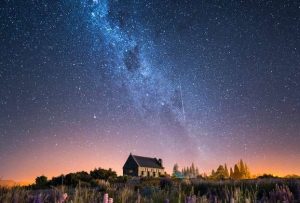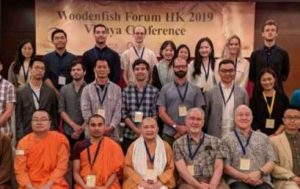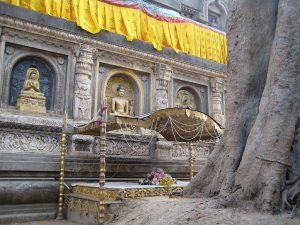
What is the difference between Heaven and a Buddha’s Pure Land? This is a question that has vexed outsiders and beginners to Pure Land Buddhism. In this article I’d like to explore in detail why the two are different for Buddhists.
The Theory of Karma in Buddhism
According to the Buddhist tradition, there are six planes of existence, which are also regarded as the mental states of spiritual beings (with consciousness), usually called the Six Realms – heaven, asura, human, animal, ghost and hell.
Whether a person will be in heaven, or in hell, or continue to be in the human realm depends on his karma accumulated in all his past lives. The next destiny of a being is determined by what he does, what he speaks and what he thinks. It is governed by the Law of Cause and Effect, a universal law in our world.
According to the Theory of Karma, if a person practices the Ten Good Deeds, he will be reborn in the realm of heaven in a future life, but not necessarily in the next life. If a person practices the Five Precepts, he will be a human being in a future life. If a person has greed, hatred and delusion in his karma in his past lives, he will eventually fall into one of the Three Wretched Realms – hell, ghost or animal.
The relationship between cause and effect is definite, for instance, when birth is taken as a cause, death is certainly an effect. No one can change this fact. However, no one knows when one dies, as it also depends on conditions that are external factors, out of one’s control. Some of them are favorable, and some are not. Some of them are dominantly strong, and some are insignificantly weak. Our destiny is determined by the causal conditions of our karma in past lives. All ordinary beings cannot escape from the cycle of birth and death within the Six Realms.
The concept of heaven in Buddhism
In Buddhism, heaven is a complicated plane of existence. It is not just one heaven but 28 in total, categorized in three domains. The heaven mentioned in the previous paragraph is known as ‘desired heavens’, six in total because the heavenly beings have sensual desires, including food, sex, etc. The more material desires you have, the lower the level of the desired heavens you will reside in. The higher the level of the desired heavens, the higher the spiritual happiness you enjoy will be.
The other 22 higher heavens in 2 other domains are accessible through intense meditation. The beings in these heavens have no desires. The first domain is known as ‘form heavens.’ There are forms / matters in form heavens, but they exist in space, without physical matters on the ground. There are 18 form heavens, divided into four different meditative levels.
The second domain is known as ‘formless heavens’, only 4 in total. These heavens are purely spiritual with mental activities. There is no form / matter in space or on the ground. That is why these are called ‘formless heavens.’ The higher the level of heaven you are in, the longer life you will have. The highest one is ‘the heaven of neither perception nor non-perception’, and the lifespan of the beings in this heaven is 84,000 great kalpas in human years.
Broad meaning of a Pure Land
What is a Pure Land? Broadly speaking, pure and impure are relative. If a land is relatively purer than the other land, it is called ‘pure land,’ and the other land is called ‘defiled land.’
Pure land can be a land in the human realm. For instance, our human world will become a ‘pure land in the human realm’ by the time of Maitreya Bodhisattva, 5.6 billion years from now. It is called ‘Pure Land in the human realm’, because human beings and their land is the best as far as a realm of human beings is concerned. The average age of human beings by that time will be 84,000 years. Taking in account of the average age is only 80 years nowadays, our land is called a ‘defiled land in the human realm.’
Pure land can exist in heaven, like the inner space in the Tusita Heaven. It is the fourth one in the desire heavens, but its inner space is called ‘pure land in the heaven realm.’ There are pure lands in other realms, like Bodhisattvas. In this respect, Pure Land is not just a heaven.
Nevertheless, in Buddhist scriptures, Pure Land generally refers to the land in the Buddha realm, which is ultimately pure. Strictly speaking, Pure Land is the homeland of a Buddha. Each Buddha has his own Pure Land. For instance, Bhai?ajyaguru (Medicine Master) Buddha’s Pure Land is called the Land of Lapis Lazuli in the east, while the Land of Bliss is the Pure Land of Amitabha Buddha. Generally, only Buddhas can get access to the Buddha’s Pure Land, as this realm is extremely profound, splendid and inconceivable.
However, when we speak of a teaching, or a school in Mahayana Buddhism, Pure Land specifically refers to Amitabha’s Pure Land, the Land of Bliss, not any other pure lands, even any other Buddha’s pure lands.
The Land of Bliss is not a heaven
One of the Pure Land scriptures said, “Pure Land does not belong to the Three Realms. Why? It is not desired heaven, because there are no sensual desires in the Pure Land. It is not form heaven, because inhabitants live in a palace on earth with trees, water, etc. It is not formless heaven, because there are splendid forms / matters in the Pure Land.”
In explaining this passage regarding the practice for rebirth in the Pure Land in the Amitabha Sutra, Master Shandao wrote a verse in his ‘In Praise of Dharma Practices’: The Land of Bliss is a realm of unconditioned nirvana’.‘Unconditioned’ means intrinsic and natural, non-differentiated and absolute, while ‘conditioned’ means deliberate and artificial, differentiated and relative. As an unconditioned realm, it transcends space and time, and it has no deliberate action, no birth and no death, and not differentiated but equal, not relative but absolute. Only such a domain can be described as unconditioned nirvana, which is actually a Buddha’s realm, and is totally beyond our imagination.











